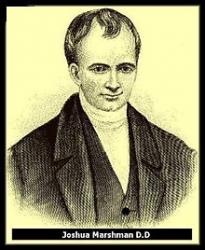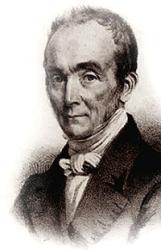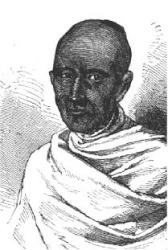Planning worship?
Check out our sister site, ZeteoSearch.org,
for 20+ additional resources related to your search.
- |
User Links
Person Results
Theodore E. Perkins

1831 - 1912 Person Name: T. E. Perkins Hymnal Title: Hymnal for the Sunday School Composer of "REPENTANCE" in Hymnal for the Sunday School Theodore E. Perkins was born at Poughkeepsie, on the Hudson, N.Y., July 21, 1831. His father was a Baptist clergyman. The family of ten brothers and sisters sang and played various instruments, forming among themselves both choir and orchestra. His musical education began at the early age of three years. During his father's pastorate at Hamilton, N. Y., the choir rehearsals were often held at the parsonage, and the leader used to place the three-year-old on a small stool, on the table around which the choir was assembled, giving him a chance to both see and hear. Later on he played the violincello in church, standing on a stool in order to finger the instrument.
The home gatherings — especially on Thanksgiving Day, are the recollections among the happiest of his childhood. His father became pastor of the Berean Baptist Church in New York City, in 1839, giving him the opportunity of studying the pianoforte, of which he became a proficient player. His fine alto voice soon gave him notoriety. At the age of nineteen while filling a position as clerk in New York, all his spare time was given to the study of voice and piano. In 1851 he went to Hamilton, N. Y., taught music in Madison University (now Colgate), and in the Female Seminary.
In 1854 he went to Port Jervis, N. Y., where he taught singing school, and April 30, 1855, married Mary Frances Caskey, who was for years his soprano soloist in many musical Festivals and Conventions. Soon after marriage he removed to Salem, N. J., where his lifework as singing school teacher really began, including Bridgeton and prominent towns in southern New Jersey. During the summer of 1856 he and his wife were pupils of the Normal Academy of Music at North Reading, Mass., conducted by Drs. Lowell Mason and Geo. F. Root. During 1856-1858 he was given the position of assistant teacher and manager. His association with these two great men gave an inspiration to all his future work.
In 1859 he was co-principal with Wm. B. Bradbury at the Normal Academy of Music, Geneseo, N. Y. He remained at Geneseo until 1863. Professor Perkins also held very successful schools in North Pelham Province of Ontario, Canada, and in 1864-1868 was principal in schools at Tunkhannock and Meadville, Pa.
In 1860, The Olive Branch, his first book of church music, was published by F. J. Huntington, New York City, the sales reaching 100,000. Next was Oriental, which sold over 30,000. The Union, Glees and Anthems, and Sabbath Anthems followed ; then The Sacred Lute, which sold over 300,000. His Sunday-school books commenced with The Evergreen, followed by the Shining Star and New Shining Star. Then came Psalm King, which was the last of the books published by Mr. Huntington. Hallowed Songs was published by Philip Phillips; The Sunday School Banner was published by Wm. B. Bradbury. The Royal Standard was published in Toronto, Canada. The Golden Promise, Sabbath Carols, The Mount Zion Collection were published under his own supervision.
His Free Sunday School Songs several times numbered over 500,000 a month. Coronation Songs with Rev. Dr. Deems as hymn editor was published by A. S. Barnes Co., who also published Psalms and Hymns and Spiritual Songs, in which Dr. C. S. Robinson was hymn editor, who with Professor Perkins edited Calvary Songs, published by the American S. S. Union. Gospel Tent Songs was evangelical. The Safe-Guard Singer was his temperance book.
Mr. Perkins was musical director in the following churches in Brooklyn: The Lafayette Avenue Presbyterian Church, Rev. Dr. Cuyler; Strong Place Baptist Church, Rev. E. E. L. Taylor, D. D.; Madison Avenue Baptist Church, Rev. H. G. Weston, D. D., L. L. D.; Fifth Avenue Presbyterian Church, Rev. Dr. Rice, followed by Dr. John Hall; The Memorial Presbyterian Church, Rev. Dr. C. S. Robinson, who was his close friend; The Church of the Holy Trinity, Rev. Dr. Tyng, Jr. ; Trinity Baptist Church, Rev. Dr. J. B. Simmons, and Washington Square M. E. Church.
In Philadelphia: The Fifth Baptist Church, Rev. Dr. Chase; The Eleventh Baptist Church, Rev. Dr. Colman; The Tabernacle M. E. Church, Rev. George Gaul, D. D. He was leader and singer in Evangelistic Services, at the Rink, The Old Madison Square Garden and Cooper Union, all of New York City. The music of the first great meeting of the world's Evangelical Alliance, held for ten days in New York City, was under his direction, as was the first National Sunday School convention, held in Newark, N. J. He was also conductor at the Golden Anniversary of the Female Guardian Society, leading a chorus of forty-two hundred children. In the opening chorus, Great is the Lord, by Dr. Calcott, the word "Great" was given with so much decision and power that the clergymen on the platform sprang to their feet and remained standing until the chorus was finished.
He taught voice culture in Princeton and Lafayette Universities, The Union Theological Seminary, New York City; Crozer Seminary, Chester, Pa., and organized the music department of Temple University, Philadelphia, continuing in charge four years. He had charge of the children's choir of Howard Mission, New York City, for twenty-five years, and thinks that some of the happiest and most restful of the working hours were spent in teaching the poor children of the fourth and sixth wards to sing the Gospel. Mr. Sankey said to Mr. Perkins that " Jesus of Nazareth was my banner song for eight years." Jesus is Mine has been sung at the Christian's death-bed, the grave, and once as the convict was going to the scaffold.
His Christmas Carol Sweetly Carol had a very large sale in this country, and was republished in England, France, Italy, and Germany.
For a period of forty years he has made the study of the voice special work. The most thorough investigations of the voice and its possibilities were made with the assistance of the late John Howard, extending over a period of twenty-five years, during which he has had the care of over two thousand voices. He published a work entitled, Physiological Yoice Culture, edited by his son, the late T. Edward Perkins, M. D., physician and throat specialist of Philadelphia. Mr. Perkins also completed a method of voice culture based on the principles of John Howard's Physiology of Artistic Singing."
During these years of work he has found time to edit thirty-four books of church, Sunday-school, day-school, and glee music, the larger portion having been previously mentioned. Also songs and ballads in sheet form, and a cantata entitled, The Excursion, libretto by Fanny Crosby, with whom there has existed an unbroken friendship for over forty years.
-Biography of Gospel Song and hymn Writers
Theodore E. Perkins
Berthold Tours
1838 - 1897 Person Name: B. Tours Hymnal Title: Laudes Domini Composer of "MARSHMAN" in Laudes Domini
Berthold Tours
Joshua Marshman

1768 - 1837 Person Name: J. Marshman Hymnal Title: Songs for the Lord's House Translatore of "O thou, my soul, forget no more" in Songs for the Lord's House Marshman, Joshua, D.D., was born at Westbury Leigh, Wiltshire, April 20, 1768, and educated for the Baptist ministry at the College at Bristol. In Oct. 1799 he joined Dr. Carey at Serampore, India. In 1826 he visited England, and returned to India in 1829. He died at Serampore, Dec. 5, 1837. His translation of Krishnu Pal's hymn is noted at p, 633, ii. In his Baptist Hymn Writers, Portland, U.S.A., Dr. Burrage attributes the original hymn, “Hail, precious book divine" (Holy Scripture) to him, but leaves its date and place of publication unnoted.
--John Julian, Dictionary of Hymnology, Appendix, Part II (1907)
====================
In early life he evinced a fondness for books and study. In 1794, he accepted the charge of a school connected with the Broadmead Baptist church, Bristol, and not long after he was baptized, and united with the church. At the same time he entered the theological seminary at Bristol, and devoted himself to the Hebrew, Syriac, and other languages. Becoming interested in Dr. Carey’s work in India, he and his wife, in 1799, offered themselves for missionary service, and sailed May 29, for India. They landed at Serampore October 13, and the mission was established there, Dr. and Mrs. Marshman opening a boarding-school to aid them in the prosecution of their work. In 1806, Dr. Marshman commenced the study of the Chinese language for the purpose of translating the Scriptures into that tongue. In 1814, he published his “Key to the Chinese Language,” and in fifteen years from the time he commenced his study of the language he completed the publication of the first portion of the Scriptures in the Chinese language, consisting of the book of Genesis, the four Gospels, and Paul’s Epistles to the Romans and Corinthians. In 1826, he visited England, and returned in India in 1829…In 1811, Brown University conferred upon him the honorary degree of Doctor of Divinity.
Marshman’s works include:
Dissertation on the Characters and Sounds of the Chinese Language, 1809
The Works of Confucius, Containing the Original Text, with a Translation, 1811
A Defence of the Deity and Atonement of Jesus Christ, 1822
Sanskrit Grammar, with Henry Carey
Bengalee and English Dictionary, with Henry Carey
http://www.hymntime.com/tch/bio/m/a/r/s/marshman_j.htm
=================
http://en.wikipedia.org/wiki/Joshua_Marshman
Joshua Marshman
Ami Bost

1790 - 1874 Person Name: Paul Ami Isaac David Bost, 1790-1874 Hymnal Title: The Cyber Hymnal Composer of "OBERLIN (Bost)" in The Cyber Hymnal Rev. Paul Ami Isaac David Bost, was born on June 10, 1790 in Geneva, Switzerland. He studied theology at the Moravian Institute at Neuwied and at the University of Geneva. He was an itinerant preacher in Switzerland, Germany and France. In 1825, he co-founded the Reformed Free Church of Geneva. From 1828-37 he worked as an evangelist in Carouge, After a brief pastorate at Asnires and Bourges in France, he was appointed chaplain of the prison of the Maison Centrale at Melun, where he remained until 1848, then lived in Geneva. He died on December 24, 1874 in Prigonrieux, Aquitaine, France.
© The Cyber Hymnal™ (hymntime.com/tch)
Ami Bost
A. J. Showalter

1858 - 1924 Hymnal Title: The Gospel Way Composer of "[O thou, my soul, forget no more]" in The Gospel Way Anthony Johnson Showalter USA 1858-1924/ Born in Cherry Grove, VA, he became an organist, gospel music composer, author, teacher, editor, and publisher. He was taught by his father and in 1876 received training at the Ruebush-Kieffer School of Music, Dayton, VA. He also attended George Root’s National Normal school at Erie, PA, and Dr Palmer’s International Normal at Meadville, PA. He was teaching music in shape note singing schools by age 14. He taught literary school at age 19, and normal music schools at age 22, when he also published his first book. In 1881 he married Lucy Carolyn (Callie) Walser of TX, and they had seven children: Tennie, Karl, Essie, Jennie, Lena, Margaret, and Nellie. At age 23 he published his “Harmony & composition” book, and years later his “Theory of music”. In 1884 he moved to Dalton, GA, and in 1890 formed the Showalter Music Company of Dalton. His company printed and published hymnals, songbooks, schoolbooks, magazines, and newspapers, and had offices in Texarkana, AR, and Chattanooga, TN. In 1888 he became a member of the M T N A (Music Teachers National Association) and was vice-president for his state for several years. In 1895 he went abroad to study methods of teachers and conductors in Europe. He held sessions of his Southern Normal Music Institute in a dozen or more states. He edited “The music teacher & home magazine” for 20 years. In 1895 he issued his “New harmony & composition” book. He authored 60+ books on music theory, harmony, and song. He published 130+ music books that sold over a million copies. Not only was he president of the A J Showalter Music Company of Dalton, GA, but also of the Showalter-Patton Company of Dallas, TX, two of the largest music publishing houses in the American south. He was a choir leader and an elder in the First Presbyterian Church in Dalton (and his daughter, Essie, played the organ there). He managed his fruit farm, looking after nearly 20,000 trees , of which 15,000 are the famous Georgia Elberta peaches, the rest being apples, plums, pecans, and a dozen other varieties of peaches. He was also a stockholder and director of the Cherokee Lumber Company of Dalton, GA, furnishing building materials to a large trade in many southern, central and eastern states. He died in Chattanooga, TN, and is buried in Dalton, GA. He loved hymns, and kept up with many of his students over the years, writing them letters of counsel and encouragement. In 2000 Showalter was inducted into the Southern Gospel Music Hall of Fame.
Note: Showalter received two letters one evening from former music students, both of who were grieving over the death of their wives. He had heard a sermon about the arms of Moses being held up during battle, and managed to form a tune and refrain for a hymn, but struggled to find words for the verses that fit. He wrote to his friend in OH, Rev Elisha Hoffman, who had already composed many hymns and asked if he could write some lyrics, which he gladly did.
John Perry
A. J. Showalter
Krishna Pal
1764 - 1822 Person Name: Krishnu Pal, 1764 - 1822 Hymnal Title: The Hymnary for use in Baptist churches Author of "O thou, my soul, forget no more" in The Hymnary for use in Baptist churches
Krishna Pal
Timothy B. Mason

1801 - 1861 Person Name: Timothy Battle Mason, 1801 - 1861 Hymnal Title: The Hymnary for use in Baptist churches Composer of "EDEN" in The Hymnary for use in Baptist churches Timothy Batelle Mason USA 1801-1861. Born at Medfield, MA, a younger brother of Lowell Mason, he became an author and wrote or co-authored several works, including: “The sacred harp” (1836), “The liberty minstrel” (1845), “The shawm: a library of church music” (1853), “A journey through Kansas” (1855). He founded the Eclectic Academy of Cincinnati, OH. In 1821 he married Alma Harding, and they had six children: Alma, Lucretia, Addison, Henry, Mary, and Abbie. His wife, Alma, died in 1836. In 1837 he married Abigail (Abby) K Hall, and they had three children: Edward, Helen, and William. He was an author, arranger, editor, and compiler of anthems, hymns, tune books, scores, Psalms, motets, and shape-note hymnals. He died from cancer at Cincinnati, OH.
John Perry
Timothy B. Mason
Pal, Krishnu

1764 - 1822 Person Name: Krishna Pal Hymnal Title: The Seventh-Day Adventist Hymn and Tune Book Author of "O Thou, my soul, forget no more" in The Seventh-Day Adventist Hymn and Tune Book Krishnu Pal, the first Hindoo who was baptized in Bengal, was born about 1764, and baptized at Serampore by the celebrated Baptist missionary, William Carey, on Dec. 28, 1800. He became a useful Christian minister, and wrote several hymns in the Bengali language. One of these was translated into English by Dr. Marshman in 1801 as "O thou, my soul, forget no more" (Christ the Friend). It was included in the 27th ed. of Rippon's Baptist Selection, 1827, No. 170, Pt. 2, in 6 stanzas of 4 lines, in Bickersteth's Christian Psalmody, 1833, in 5 stanzas, and again in later collections, including the Baptist Hymnal, 1879, and others. Krishnu died at Serampore, Aug. 22,1822.
[Rev. W. R. Stevenson, M.A.]
--John Julian, Dictionary of Hymnology (1907)
Pal, Krishnu
Henry K. Oliver
1800 - 1885 Person Name: Henry Kemble Oliver Hymnal Title: The Seventh-Day Adventist Hymn and Tune Book Composer of "FEDERAL STREET" in The Seventh-Day Adventist Hymn and Tune Book Henry Kemble Oliver (b. Beverly, MA, 1800; d. Salem, MA, 1885) was educated at Harvard and Dartmouth. He taught in the public schools of Salem (1818-1842) and was superintendent of the Atlantic Cotton Mills in Lawrence, Massachusetts (1848-1858). His civic service included being mayor of Lawrence (18591861) and Salem (1877-1880), state treasurer (1861-1865), and organizer of the Massachusetts Bureau of Statistics and Labor (1867-1873). Oliver was organist at several churches, including Park Street Congregational Church in Boston, North Church in Salem, and the Unitarian Church in Lawrence. A founder of the Mozart Association and several choral societies in Salem, he published his hymn tunes in Hymn and Psalm Tunes (1860) and Original Hymn Tunes (1875).
Bert Polman
Henry K. Oliver


 My Starred Hymns
My Starred Hymns


